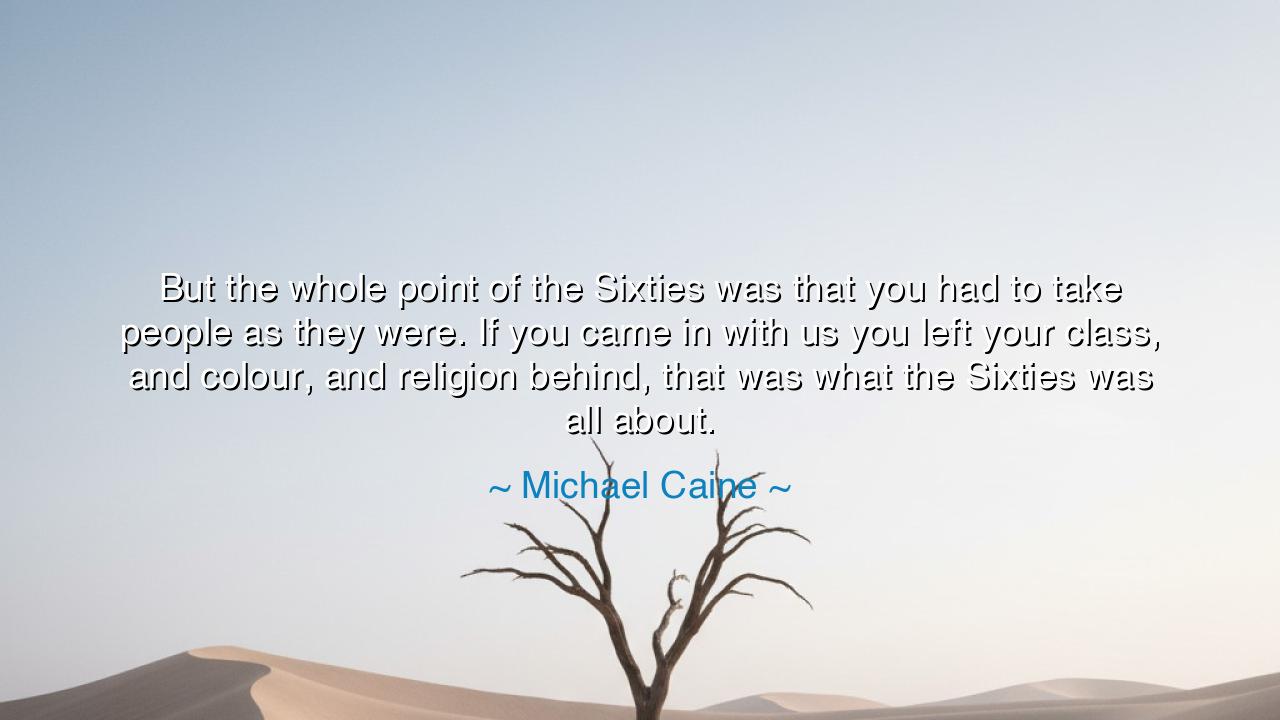
But the whole point of the Sixties was that you had to take
But the whole point of the Sixties was that you had to take people as they were. If you came in with us you left your class, and colour, and religion behind, that was what the Sixties was all about.






"But the whole point of the Sixties was that you had to take people as they were. If you came in with us you left your class, and colour, and religion behind, that was what the Sixties was all about." These powerful words from Michael Caine capture the essence of a transformative decade, one in which the world witnessed a profound shift in the way we viewed identity, society, and human connection. The Sixties were not merely a time of cultural change; they were a moment in history when the divisions between people—based on class, race, and religion—began to dissolve, if only for a brief moment, in the name of unity and collective action. At the heart of this revolution was the idea that true freedom comes not from the external markers of who we are, but from embracing one another for our shared humanity.
In the midst of the social upheavals of the Sixties, countercultures emerged, challenging the established norms that had long divided people. The Civil Rights Movement, led by figures such as Martin Luther King Jr., demanded that people be seen not for the color of their skin, but for their worth as individuals. In the same breath, the hippie movement called for a radical shift in how we viewed society and our place within it. The core message of the Sixties was clear: boundaries—whether of class, race, or faith—should not define or divide us. People, in all their diversity, were invited to come together to create a world of acceptance, where love, compassion, and mutual respect triumphed over prejudice and hatred.
This idea of leaving behind class, colour, and religion was not just an intellectual exercise; it was a revolutionary act. To truly embrace this vision was to challenge every societal construct that had been built over centuries, to abandon the identities and labels that separated us from one another. It was to see people not through the lenses of social stratification, but through the eyes of compassion, where each individual was valued for their intrinsic humanity, rather than their social status or ethnic background. In a world that was still reeling from the aftermath of World War II, this vision of a unified world was a beacon of hope, a call to action that was both powerful and necessary.
Consider the example of the Woodstock Festival of 1969, a gathering that became emblematic of the Sixties’ spirit of unity. Over 400,000 people from all walks of life—different races, classes, and beliefs—came together, united not by their differences but by their shared desire for peace, freedom, and love. In that moment, the distinctions that so often divided them—race, religion, and class—faded into the background as the music, the message of peace, and the collective experience of being human took center stage. The world, for a brief moment, was united by something much more profound than its divisions: a shared yearning for freedom and equality. Woodstock is often remembered not just for its music, but for its message of unity and acceptance, that we are all part of one human family, regardless of the labels society places upon us.
The Sixties were a time of great change, but also of great hope—hope that, despite our differences, we could build a society where we all respected and embraced one another for who we truly were. However, this vision was not without its struggles. Resistance to the idea of unifying beyond divisions was fierce, and many of the struggles that were begun in that time—whether for civil rights, gender equality, or LGBTQ rights—continue to this day. But the message of the Sixties, as Caine reminds us, remains timeless: the key to progress lies in accepting one another as we are, casting aside the barriers that divide us, and moving forward together as a collective.
The lesson from the Sixties is not just an historical artifact—it is a call to action for the present and the future. Class, race, and religion should never define our interactions with others. To truly embrace the teachings of the Sixties is to challenge the labels that society places upon us, to view each person we meet not through the lens of their external identity, but through the shared humanity we all possess. It is a reminder that unity is not merely an ideal, but a practical, achievable goal that requires conscious effort, compassion, and the willingness to let go of what divides us.
As we move through our lives, let us not forget the lessons of the Sixties. Acceptance, compassion, and unity are the bedrock of a just society—one where the boundaries of class, race, and faith dissolve in the face of our shared humanity. Let us strive, in our own actions and in our communities, to create a world where, as Michael Caine puts it, we leave behind the labels and accept one another for who we truly are, not the masks that society has placed upon us. The world is waiting for us to live out this vision, and it starts with us.






AAdministratorAdministrator
Welcome, honored guests. Please leave a comment, we will respond soon